Announcement from Japan Customs | Mandatory to Use ACP in Many Cases - Attorney for Customs Procedure
Last Updated on April 27, 2024 by SK ADVISORY INC
We would like to inform you about a significant revision by Japan Customs, which clarifies the definition of an Importer. This change took effect on October 1, 2023.
With the revision, there has been an increase in cases where foreign corporations must use an Attorney for Customs Procedures (ACP) to become an Importer of Record (IOR) themselves. It is no longer feasible to nominate another entity merely in name as the importer.
In instances other than normal import transactions between an overseas seller and a Japanese buyer, where the importer does not have the authority to dispose of the goods after importation (for example, when a foreign corporation does not become the IOR themselves and nominates a forwarder, customs broker, or another third party who is not involved in the transaction to be the nominal IOR), there is a high probability that approval will not be granted as such nominations are not recognized as legitimate importers, necessitating caution.
Primarily, foreign corporations acting as importers themselves (utilizing a Customs Broker) can also enjoy Japan Consumption Tax (JCT) benefits. (link: Consumption Tax Treatment and Benefits of Using ACP).
As a professional ACP firm, we follow the law to facilitate proper import procedures. You can entrust us with your importation needs with confidence. We look forward to discussing further with you.
Revisions Effective October 1, 2023:
Definition of the Importer
- Regarding a cargo imported under import transaction, an importer is equivalent to “a person who imports a cargo” defined in Article 6-1 (1), General Notification of the Customs Act. ..... This means, the Consignee, etc., in the case of imports conducted through normal transactions between an overseas seller and a Japanese buyer
- In the cases other than above, an importer is a person who has a right to disposition of the import cargo at the time of import declaration. If there is another person who acts on the purpose of the import*, that person is also included :
In case of a cargo imported:
- under lease contracts, a person who rents and uses the cargo.
- for consignment sales, a person who sells the cargo in the name of himself/herself (consignee) by accepting the commission.
- for processing or repairing, a person who processes or repairs the cargo.
- for disposal, a person who disposes the cargo.
Japan Customs: Revision of Import Declaration Items and Attorney for Customs Procedure (ACP) System
Japan Customs Notice - Available in English, Chinese, Korean, and Japanese.
Case Study: Directives to use ACP
Case 1: Importing Goods Using FS (Fulfillment Services) by Non-resident Sellers
A non-resident seller plans to import goods for sale domestically using FS provided by EC platform operators. At the time of import declaration, there is no sales contract between the seller and the consumer. The seller (non-resident) is the main entity for sales on the EC platform after domestic pickup of the goods. Therefore, the seller, who aims to sell the goods in accordance with the purpose of import, needs to become the import declarant and appoint Attorney for Customs Procedure (ACP) to carry out the import declaration.
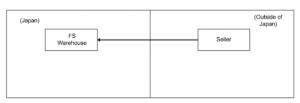
Case 2: Importing Goods Using FS by Non-resident Sellers
A non-resident seller plans to import goods for sale domestically using FS provided by EC platform operators. At the time of import declaration, there is no sales contract between the seller and the consumer. The seller (non-resident) entrusts domestic customs clearance arrangements to Company-A (located in Japan), but the main entity for selling the goods within the domestic market using FS remains the seller (non-resident). It is planned that the seller (non-resident), who intends to sell the goods on the EC platform after domestic pickup, should become the import declarant and appoints Attorney for Customs Procedure (ACP) in accordance with the purpose of import declaration.

Case 3: Importing Goods Using FS by Non-resident Sellers
A non-resident seller plans to import goods for sale domestically using FS provided by EC platform operators. At the time of import declaration, there is no sales contract between the seller and the consumer. The seller (non-resident) entrusts the transportation of the goods from overseas sellers to Japan to an overseas forwarder, but the main entity for selling the goods within the domestic market using FS remains the seller (non-resident). It is planned that the seller (non-resident), who intends to sell the goods on the EC platform after domestic pickup, becomes the import declarant and appoints Attorney for Customs Procedure (ACP) in accordance with the purpose of import declaration.

Case 4: Importing Goods for Consignment Sales
Goods (consignment sales goods) intended for domestic sale by an assignee who has received consignment sales from a non-resident consignor are imported. The imported goods are stored in an FS warehouse and sold on the EC platform under the name of the assignee. The assignee is the main entity for selling the goods within the domestic market using FS.
Either of the following options is necessary:
The consignor (non-resident) who has the authority to dispose of the consignment sales goods becomes the import declarant, appoints Attorney for Customs Procedure (ACP), and carries out the import declaration.
The assignee (i.e., the seller on the EC platform) who conducts the act of selling on behalf of themselves as the purpose of import becomes the import declarant and carries out the import declaration.
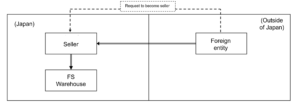
For more information regarding the revised regulations by the Japan Customs, please refer to the following:
(Link: Revision of Import Declaration Items and Attorney for Customs Procedure (ACP) System) Ministry of Finance, Japan Customs July 2023 With the expansion of cross-border e-commerce, the importation of goods for online shopping has increased, leading to a significant number of cases involving the smuggling of illegal drugs and counterfeit goods that infringe upon intellectual property rights. Particularly concerning are instances of tax evasion, where goods imported through fulfillment services (FS) are declared at unreasonably low prices to evade customs duties.
In light of these circumstances, we have conducted a review of the existing system to ensure the continued facilitation of smooth imports while effectively combating smuggling activities and ensuring proper taxation. Effective from October 1, (2023), there will be an addition to the import declaration items under the Customs Law Enforcement Order, requiring the inclusion of the "address and name of the person intending to import the goods" at the time of import declaration.
Furthermore, there will be additions to the declaration items for Attorney for Customs Procedure (ACP), including information regarding the relationship between the declarant and the Attorney for Customs Procedure (ACP). Additionally, it will be mandatory to submit the contractual documents between the declarant and the ACP. For specific details regarding the revisions to the system, please refer to the following reference materials.
Reference (Japan Customs)
・Leaflet: "Review of Import Declaration Items and ACP system
・Case Study: "Clarification of the Significance of Import Declarants"
・Revision of the ACP Application Form
Please Be Aware
In cases where foreign corporations (non-residents) without an office in Japan import goods, failure to properly prepare an Importer of Record (IOR) through an Attorney for Customs Procedures (ACP) or similar means can result in goods being held at customs, leading to significant delays and costs. To avoid such risks, please make thorough preparations.
If an ACP is needed, it is crucial to utilize the services of an experienced ACP well-versed in customs-related laws and regulations. The import and export operations of non-residents/foreign corporations using an ACP are treated as unique cases. Many customs brokers are not familiar with these procedures, leading to incidents where goods are detained for extended periods due to unsuccessful explanations to customs. (Customs will not permit the import if the explanations provided by the importer or customs broker are unsatisfactory, resulting in the goods being detained until customs is convinced.)
We highly recommend utilizing our services as professional experts in customs, knowledgeable about customs-related laws and regulations. With a proven track record of resolving numerous issues through direct consultations with customs officers and customs brokers, our clients supported as an ACP now exceed 100 companies. We are committed to delivering industry-leading results with our expertise.
Why choose us?
- Customs and International Trade Professionals - Our CEO, Mr. Sawada, is a Certified Customs Specialist in Japan. With years of experience providing services in the Trade & Customs field, his leadership at KPMG and the establishment of his own company, SK Advisory, ensures our commitment to excellence and high-quality service.
- Full Adherence to Japanese Customs Law - Our top priority is to maintain full compliance with Japanese Customs Law and safely import / export our clients' goods into / from Japan. We meticulously manage all import compliance aspects, including Japan Importer of Record (IOR) matter, HS code classification and the correct Customs Valuation of goods entering Japan. We support to complete all the necessary shipping documents, such as Invoice, Packing List and BL, on behald of non-resident / foreign Japan IOR.
- Communication in English, Chinese, and Japanese - Our team, with extensive international experience, excels in communication in English, including facilitating English-language meetings, and has earned considerable trust from clients. We also have staff capable of communicating in Chinese, making us equipped to handle Chinese-language support as well. Naturally, as a Japan-based team, we're totally fluent in Japanese, ensuring seamless communication across these three key languages.
- Reputable and Reliable Partner -The growing demand for our Attorney for Customs Procedures (ACP) services is testament to our quality. We proudly serve clients globally, registering over 50 ACP customers annually. Our consistent track record underscores our reliability and credibility. For a detailed list of our clientele, please visit our "Experiences" section. Our unwavering commitment ensures all our clients successfully acquire Japan IOR status and import goods seamlessly into Japan.
- Recognized ACP Service Provider on Amazon SPN SPN (Service Provider Network) - We are a certified ACP service provider within Amazon's Service Provider Network (SPN), listed under the Trade Compliance category. Many international Amazon Sellers have successfully become Japan Importers of Record (IOR) through our ACP services.

Our Customers - Japan IOR / Attorney for Customs Procedures (ACP) Service
All our clients have successfully become Japan Importer of Record (IOR) and imported goods into Japan under our guidance.

Logistics Companies with Collaboration Experience
Here is a list of our partner logistics and forwarding companies with whom we have had successful collaborations. Please note that this list is not exhaustive, as we are open to working with any logistics or forwarding companies. As Attorneys for Customs Procedures (ACP), we represent non-resident clients (IOR) and coordinate with these logistics companies, who manage the transportation of goods to and from Japan.
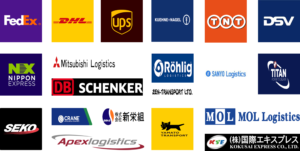
Our ACP Service: The Best Solution for the Japan Importer of Record (IOR)
Attorney for Customs Procedures (ACP) is the best solution for addressing the issue of Japan IOR - Importer of Record. Below is an outline of our primary services and a diagram illustrating the operational structure of the ACP service. Upon successful ACP registration, a foreign entity can become the Japan IOR - Importer of Record.
Basic Scope of Services:
- Consultation with the Japan Customs Office for successful ACP registration.
- Liaising with stakeholders, including Logistics Forwarding Companies and the Customs Offices, on behalf of non-resident clients (i.e., non-resident Japan IOR) to ensure the secure importation of goods.
- Assistance in preparing the necessary documentation for import clearance.
- Support of calculation of Customs Value (Customs Valuation Formula), in accordance with appropriate compliance under the Japan Tariff Customs Law.
- Security Export Control (Classification for List Control, Examination for Catch-All Control, Application of the license to Ministry of Economy, Trade and Industry)
- Documents keeping, required under article 95 - Japan Customs Law
- Providing professional trade/customs advice if any issues arise.
**Both import and export activities can benefit from the use of an ACP (Attorney for Customs Procedures). This support is applicable in scenarios where a non-resident acts as the Importer of Record (IOR) for imports and as the Exporter of Record (EOR) for exports.
Three Steps to Initiate Shipments Under the ACP Program: :
-
Quotation Review to Contract Conclusion: Upon receiving your contact details, we will promptly provide a quotation for your review.
-
Commencing the Registration of ACP (Attorney for Customs Procedure) to Japan Customs: This process is generally completed in about two weeks.
-
Initiation of First Shipment, Import/Export
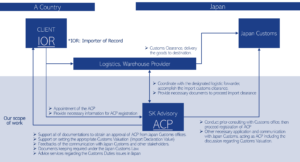
FAQ for ACP (Attorney for Customs Procedures)
What is the role of ACP (SK Advisory)?
- Representation: ACP (SK Advisory) represents the foreign importer and liaises with Japan Customs and the Forwarding Company/Customs Broker.
- Documentation and Compliance: ACP assists in preparing essential import documents (e.g., Invoices) in compliance with Japan Customs Law and formally requests the Customs Broker to proceed with customs clearance.
- Expert Consultation and Troubleshooting: We are a team of legal experts in Customs Laws, providing direct consultations with Japan Customs to ensure compliance and address issues, including troubleshooting unique challenges in non-resident imports.
How long time does it require to get ACP’s registration?
It will take approximately 2 weeks until getting an approval from Japan Customs Office.
The breakdown of the task is as follows.
- Prepare the necessary documentation between us
- Start pre-consultation with Japan Customs Office and proceed initial review
- Submit paper-based set of application documents to Japan Customs Office for final review
What kind of documents to be necessary for ACP application?
Not limited, but for instance - Power of Attorney, Company Registry, The calculation method of Customs Valuation, Catalog of the import goods, business/logistic flow
ACP can handle all kinds of goods?
ACP, is not capable to handle all kinds of goods. If the goods are subject to specific regulations requires importer to be resident in Japan, such goods can not be handled under the ACP. Restricted regulations are, for instance, Act on Pharmaceuticals and Medical Devices, or PSE/PSC.
Which regions in Japan are we covering?
Any region in Japan, we can handle.
What is difference between ACP and IOR?
ACP is not the Importer. ACP enables non-resident entities to become IOR (Importer of Record).
How does the Japanese New Invoice System affect? - Advantage of using ACP -
Recently, many companies register JCT (Japanese Consumption Tax) because the new invoice system for JCT will start in October 2023. The concept of the new invoice system is very similar to the EU’s VAT invoice system.
Your Japanese customer can’t claim input tax credits unless the sellers(suppliers) issue a qualified invoice that is written a JCT number. To issue a qualified invoice, sellers(suppliers) need to be a taxable entity and get a JCT number.
Before the Invoice system is introduced (before Oct 2023):
- A company that paid consideration of goods or services (=Company-B) is able to deduct Input JCT of the consideration regardless of whether the vendor (issuer of invoice, =Company-A) is a JCT-taxable or Non JCT-taxable company.
- There is no way to confirm whether the vendor (=Company-A) is JCT-taxable or Non JCT-taxable company.
After the Invoice system is introduced (after Oct 2023):
- A company that paid consideration of goods or services (=Company-B) is able to deduct Input JCT of the consideration only if the vendor (Company-A) has its invoice registration number.
- Company-B requests Company-A to issue the qualified invoice. If Company-A cannot submit qualified invoice, Company-B will no longer want to buy from Company-A.
**If Company-A only sells to consumers (not business entities), it may not require for Company-A to issuethe qualified invoice since normally consumers would not tend to do tax return.
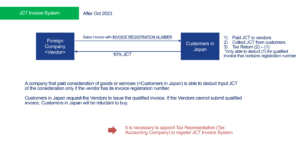
Once the Comapny-A (Seller/Supplier) obtains the JCT invoice registration number, which means this company becomes a taxable entity that is obligated to file JCT tax returns on a regular basis.
For the case of a non-resident entity (Company-A), when Company-A imports and sells to customers in Japan, following 3 steps are the standard procedure.
(1) Pay import JCT to a customs office, 10% of the import customs value when Company-A imports.
<PAY TO CUSTOMS OFFICE>
(2) Obtain JCT from a customer in Japan, 10% of the sales price when Company-A sells
(3) Submit JCT tax return
(3-1) If you paid (1) as IOR = Importer, which means you appoint ACP, then you’re required to pay only the difference amount (2) – (1)
(3-2) If you paid (1) but you were not IOR = Importer, then you’re required to pay all the amount of (2). You can’t deduct (1).
Please be careful that only the IMPORTER can deduct the input JCT (import consumption tax) at the time of tax filing mentioned above (3). In other words, if another IOR service provider became the IMPORTER when you import, basically it would not be possible for the non-resident entity to deduct the input JCT (import consumption tax). Therefore, you have to pay all the amount of (2) to a tax office (mentioned above (3-2).
On the other hand, by importing with ACP and becoming the IMPORTER, you can deduct the input JCT (import consumption tax) when filing JCT tax returns as mentioned above (3). Therefore, you would only need to pay the difference amount (2) - (1) to a tax office (as mentioned above (3-1).
This is one of the significant advantages of using the ACP service instead of the IOR service.
For this reason, we strongly recommend using ACP so that you can become IOR.
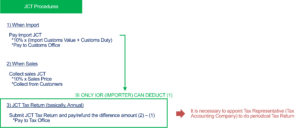
-----
For more basic information (Illustrated and Video)
- What is ACP? - Attorney for Customs Procedures
- Steps of using ACP, how foreign entity can import into Japan by ACP
- What is IOR? – Importer of Record
- Amazon won’t become an IOR
ACP insights
ACP insight 1-Customs Valuation
ACP insight 5-ACP Qualification
ACP insight 6-What kind of cases require for ACP?
ACP insight 9-ACP Import under VMI - Vendor Managed Inventory
ACP Service for Importer of Record (IOR)
ACP Service for Exporter of Record (EOR)
IOR Service for Food Tools, Kitchen Tools, Tumblers, Cutlery
Tax Representative Service (Consumption Tax)
Guidance by Amazon
According to the seller central website in Amazon, there is guidance by Amazon that a non-resident entity needs to appoint an ACP or IOR. You may check on this link:
Non-resident requirements
A Fulfillment by Amazon (FBA) seller who lives outside of Japan (non-residents) and would like to import goods into an Amazon Japan fulfillment center for storage and order fulfillment must first designate an Import of Record (IOR) and /or Attorney for Customs Procedure (ACP). This must be accomplished in advance of any importations. In general, any person who is a resident of Japan can be appointed as an IOR and/or ACP. Neither Amazon nor any of its entities in Japan may act as the IOR/ACP on the customs declaration, only the FBA seller or their designated IOR/ACP.
Amazon, Seller Central, Japan Tax and Regulatory Considerations
Also, you can check the document developed by Amazon "Understand ACP and IOR guidance".
Understand ACP and IOR
If you do not have a Japanese entity to act as the importer of record, it is mandatory that you appoint an Attorney for Customs Procedure (ACP). Overseas Sellers, as non-resident importers, can generally rely on a program called ACP to help bring their inventory into Japan. An ACP is a resident Japanese entity who registers with Japan Customs as your agent to help with entries and communications. Please note ACP does not fully take over the whole responsibility of an importer. You must ensure that your goods comply with the local laws and regulations as a part of your responsibility.
Amazon, Understand ACP and IOR guidance
Recently, Amazon issued another guidance regarding the Understanding of Attorney for Customs Procedures (ACP) in accordance with the new Japan Customs Regulations that have been effective since October 2023.
Understanding of Attorney for Customs Procedures (ACP)
Understand ACP/CPA
To import your FBA shipment, you may need an ACP (Attorney for Customs Procedures, also called Customs Procedure Agent or CPA; hereinafter ‘CPA’) to support the customs clearance
procedures for your goods. The following materials on the Japan Customs website explains in what situations you need a CPA.
https://www.customs.go.jp/shiryo/jirei.pdfIf you are required to use a CPA, Overseas FBA sellers will be filing import declarations under the seller’s name while using a CPA to help bring their inventory into Japan. A CPA is a resident Japanese entity who registers with Japan Customs as your agent to help with customs declarations and communications. Please note CPA does not fully take over the whole
responsibility of an importer. You must ensure that your goods comply with the local laws and regulations as a part of your responsibility.Please note that the customs territory of Japan is divided into regional areas that do not share information regarding CPA registration. This means you can only rely on your CPA in the region(s) where the application is received. You have to appoint a CPA in each region if necessary. Once you find out the destination Fulfillment Centre (FC) for your goods, please ensure that your CPA is registered in all required regions. For details, you should consult with the relevant customs office.
Are certain product categories limited to Japanese-resident as Importer instead of an ACP/CPA?
There are certain products that are subject to notification, certification, or registration requirements that must be met by a resident Japanese entity who is also responsible for ensuring
the imported goods comply with local laws and regulations. Because these requirements can only be met by a Japanese entity, a non-resident IOR cannot meet them. You are responsible for determining whether or not your goods require a notification, certification, or registration. Japan Customs website has provided an outline of relevant laws and ordinances as a guide but you should also consult with your customs broker or legal advisor. Additionally, all imported products must meet Japanese regulations and product labeling obligations.For more information, please refer to the Japan Customs’ website: http://www.customs.go.jp/
For more information on the 2023 Japan Customs Act Amendment, please refer to the Japan
Customs’ website:
[JP] https://www.customs.go.jp/shiryo/leaflet_jimukanrinin.pdf
[EN] https://www.customs.go.jp/shiryo/leaflet_jimukanrinin_e.pdf
[CN] https://www.customs.go.jp/shiryo/leaflet_jimukanrinin_cn.pdf
[KR] https://www.customs.go.jp/shiryo/leaflet_jimukanrinin_kr.pdf




